Blog
"I will" Statements: Embedding Careful Nursing in Practice
It's not always easy to change patterns of behaviour and it can take time to follow through on a new intention to do something in a particular way.Nurses learning about and implementing Careful Nursing in their practice have found this to be so. But, we have also found a solution, a practice embedding tool: "I will" statements.
This idea originated with nurses at Mercy Hospital and Medical Center, Chicago, USA, when they first began learning about and implementing the preliminary model of Careful Nursing in 2006. They developed practical ways for transferring concepts into actions, one of which was developing "I will" statements; what they would actually do to implement each concept. To do this they worked together to think about and discuss each concept. Then for each concept they worked out as a group, and in their own words, how they could best express the concept. Then they developed agreed upon behaviours and attitudes for implementing the concept; their "I will statements for that concept (Roemer, 2006a; 2006b). Here is one example:
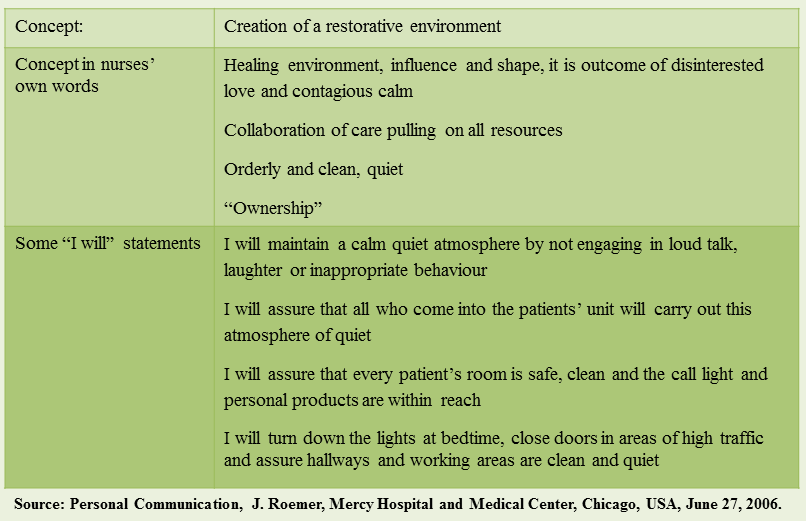
In Ireland we are finding this idea of embedding Careful Nursing in day-to-day practice using "I will" statements very useful. It is as though teaching and learning about Careful Nursing is like sewing and cultivating its seeds in our minds and using the "I will" statements is like planting out the new shoots and getting them rooted in our practice. We have not been able to find much in the literature about "I will" statements. The closest seems to be an article about "I can" statements which includes in passing mention of the use of an "I will" statement (McDuff et al, 2010).
In our hospital-based two-day workshops, conducted as part of a project designed to implement Careful Nursing, we guide nurses to develop "I will" statements to help them with the process of embedding their Careful Nursing knowledge into their day-to-day practice on their ward. We proceed one ward at a time. For each ward, groups of nurses develop three to four "I will" statements for each concept. When all the nurses from the ward have completed the workshop the groups' statements for each concept are collated. Then each ward's nurses as a group choose for each concept which statements they will focus on. The statements are then written on laminated cards and kept in places where nurses will see them each day. Information about the actual use of the statements is collected and reflected on as part of the action research aspect of the project. Here are some examples:
.png)
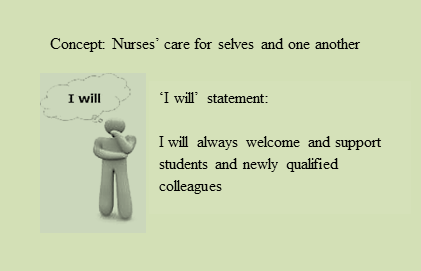
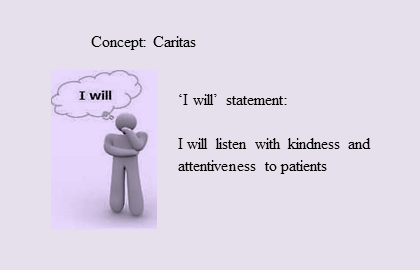
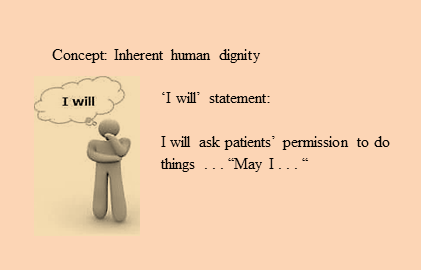
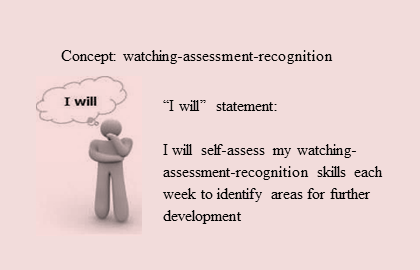

Nurses who have a formal management role are involved in embedding Careful Nursing concepts into practice through their support and encouragement. They also develop "I will" statements, for example:
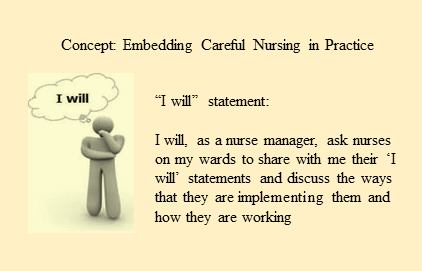
These are just a few examples. The nurses change which statements they will focus on from time to time and develop new statements. This process supports on-going learning and develops insight into the concepts. Importantly, each concept is also a nursing value. A value is something that motivates our behaviours and attitudes. Thus, this process truly engages us in embedding Careful Nursing into every aspect of our practice, enhancing patients' safety, healing and health.
Therese Meehan and Sinéad Brennan
References
MacDuff F., AlHayki K. & Linse C. (2010) Using progressive I-Can statements to promote learner confidence in writing. English Teaching Forum 4, 2–11.
Roemer J. (2006a) Reports on Careful Nursing to Senior Leadership Team and Nursing Division. Mercy Hospital and Medical Center, Chicago, USA.
Roemer J. (2006b) Department of Nursing, Mercy Hospital and Medical Center, Chicago, "I will" Statements, Personal Communication, 27th June 2006.
